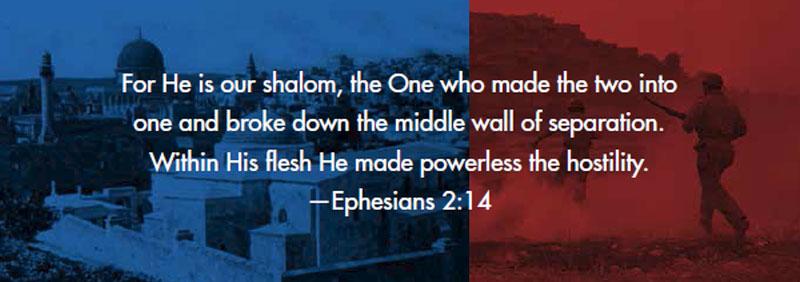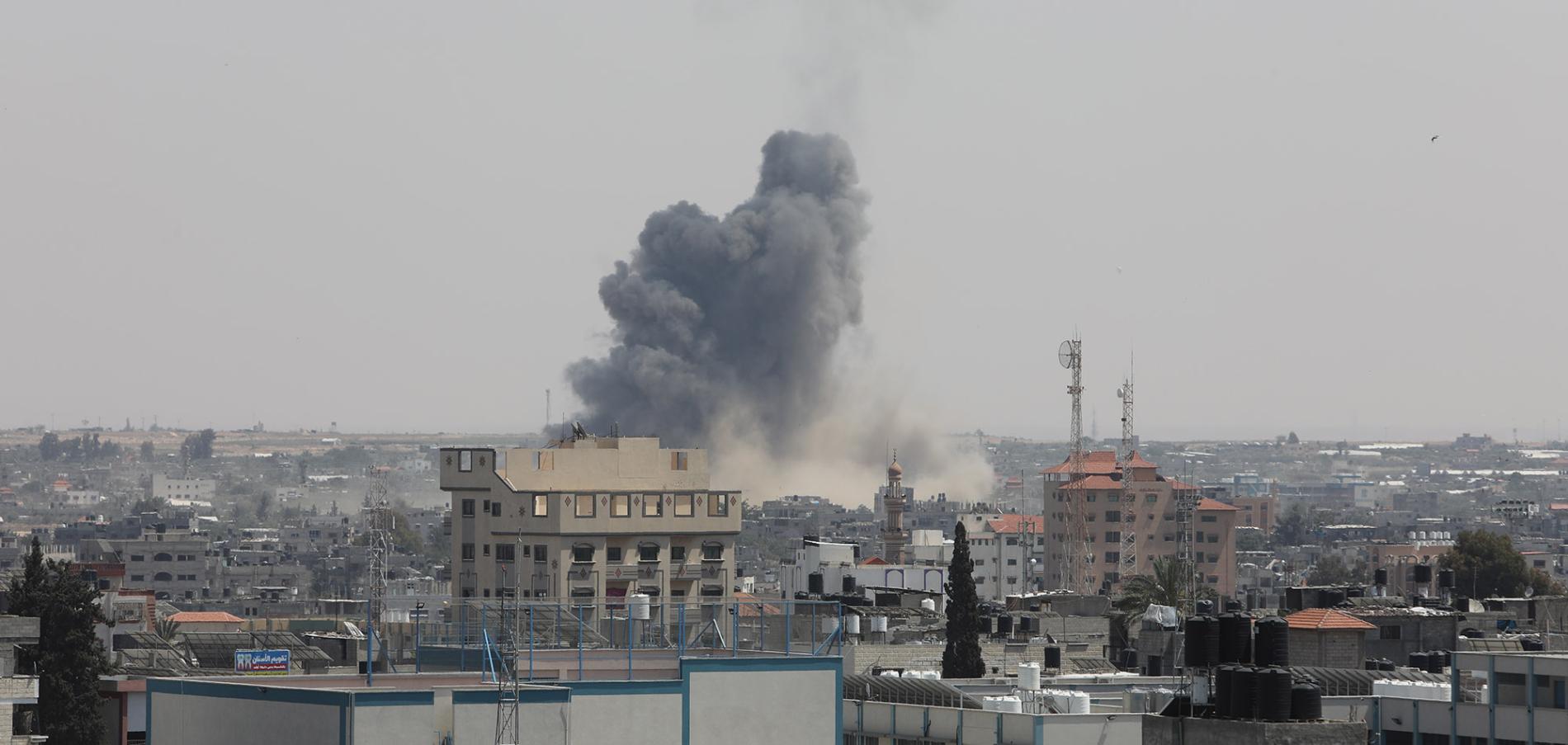
It’s not about the land
The creation of the State of Israel in 1948 didn’t take a significant amount of land from Middle Eastern Arabs. Israel comprises 0.2 percent of the Middle East’s land mass. (That’s two-tenths of one percent! Clearly, that tiny sliver of land that is Israel is not a significant amount of real estate. Even when Israel relinquished the Gaza Strip to be ruled by the Palestinian Authority in exchange for peace, the promised peace never materialized. Under Hamas’ rule, Gaza has deteriorated substantially since the 2005 agreement, while its government invests resources to build up arms for attacking Israel rather than improving the quality of life for its citizens.
It’s not about dispossession of a Palestinian people
Palestinian Arabs are not a separate people group. They have no distinguishing cultural identity setting them apart from other Arabs, and there is no distinctly Palestinian language. Palestinians are Arabs living in a region formerly known as Judea. They are no more distinct as a people from other Arabs in the Middle East than are residents of the state of Wisconsin distinct from residents of Iowa.
It’s not about a Palestinian state
Israel did not usurp a nation known as “Palestine.” When the Romans conquered Judea and destroyed Jerusalem in 70 A.D., they drove out the Jewish people. To add insult to injury, they gave Judea the name of Israel’s ancient enemy, the Philistines. The Arabic form of the name is Palestine.Palestinian Arabs were never selfgoverning.
Since the time of Yeshua (Jesus), Arabs living in the region have been ruled successively by the Romans, Byzantines, Muslims, Crusaders, and the Ottoman Empire. Then, in 1922, Great Britain gained control of the area.
For centuries, Palestinian Arabs did not demand an independent state and self-rule. United Nations Resolution 181, the 1947 agreement dividing the Land, made provision to offer the local Arabs their own state called Trans-Jordan. But they refused the Partition Plan, rejected the formation of a nation of Israel, and demanded the whole region, which was never originally theirs, be given to them.

It’s not about the refugees
Several months later, Israel declared its independence. Palestinian Arabs living in the region were offered citizenship, but they declined. That same night, surrounding nations attacked the brand-new nation. They urged Palestinian Arabs to seek refuge in their countries, assuring them they could return in no time since they believed Israel would quickly fall.
When Israel stood strong, hundreds of thousands of people remained in these neighboring Arab nations. While Israel received Jewish people who had been expelled from Arab countries, the vast Arab world refused to assimilate the Arab refugees they’d created and began calling them “Palestinians.” They could have welcomed their Arab brothers into their nations, but instead have allowed the growing refugee population to become a humanitarian crisis, while casting blame at the feet of Israel.
It’s not about “apartheid”
Israel is not an “occupying nation” forcing “apartheid” on Palestinians. True apartheid is described as officially sanctioned racial segregation along with economic and political discrimination. That is not true of Israel. Arab Israelis are full citizens, bearing the same rights as Jewish Israelis. Arabs hold political and military positions, including among Israel’s courts and governing body, the Knesset. Arabs participate freely in the Israeli economy without segregation of facilities or services. Israel protects the religious freedom of all its citizens, regardless of their faith. In fact, research shows that most Israeli Arabs prefer Israel’s rule to that of the Palestinian Authority. These are the accusations that circulate in the headlines and in speeches by Arab rulers, educators, and religious leaders, but none of them are true. Nor are any the real reason for the conflict.
So, what is the cause of the Arab-Israeli conflict? The driving force behind these attacks is a violent hatred of the Jewish people along with an insistence that the State of Israel has no right to exist. The single goal of many Palestinians and other Arab leaders? The elimination of Israel.
It is about destroying Israel
The Palestinian charter calls for the eradication of Israel by armed struggle. It also calls for the promotion and protection of its fighters, as well as the mobilization of Arabs. Is it any wonder that the Palestinian Authority refuses to condemn terrorism, discourage incitement, or stop paying terrorists for attacking and killing Israelis? Their founding charter expects those very things of them. It even calls for bringing up Palestinians in a “revolutionary fashion,” preparing them to sacrifice their lives for the cause.
Why such hatred?
What lies at the deeper root of the Arab-Israeli conflict? The absence of legitimate reasons gives us a clue. It’s a spiritual issue, and the animosity goes back to the book of Genesis, to the strife in Abraham’s household over the promised son.
Ishmael vs. Isaac
When Hagar (Sarah’s Egyptian handmaid) conceived a child by Abraham, she despised Sarah. When Hagar was sent away, she fled to the wilderness where God spoke to her about her child. This child would become the father of the Arab nations:
“… you will give birth to a son. You shall name him Ishmael, for the Lord has heard of your misery. He will be a wild donkey of a man; his hand will be against everyone and everyone’s hand against him, and he will live in hostility toward all his brothers.”
—Genesis 16:11-12 NIV
It’s easy to see that this prophecy has come to pass. From the beginning, Arab nations have relied on aggression and violence to subdue their enemies. God took compassion on Hagar and proclaimed that He would also make Ishmael a great nation, and he has done so. But God’s promise was clear: He would establish His covenant with Isaac (Genesis 17:21).
The conflict, however, reaches further back in history than the time of Ishmael and Isaac. The battle goes all the way to the Garden, and it is Satan’s battle against God.
Satan vs. God
In the Garden, after Satan’s deception and man’s fall, God proclaimed Satan’s ultimate demise. Genesis 3:15 reveals that the Messiah will crush Satan’s head in final, eternal victory. Satan has been interfering in human history from the beginning, always attempting to disprove God’s promises and prophecies.
Scripture promised the Messiah would come through the Jewish people (Genesis 12:3). Through the ages, Satan used men and nations in his efforts to destroy the Jewish people and prevent Messiah’s coming. He also knows that in the Last Days, Yeshua will return as the conquering King to Jerusalem in the Land of Israel. Trying to delay his final ruin, Satan continues to assault God’s people and the Land of Israel, seeking to annihilate them.
The true source of the Arab-Israeli conflict is Satan’s fight against God. And he is using the Palestinians, Arab terrorist groups, and worldwide propaganda in his ongoing efforts to exterminate God’s people and delay his own doom. Satan is the great deceiver. He is deceiving all who follow him, infusing them with a hatred they may not even understand. They are pawns in Satan’s battle against God Almighty.
Will there ever be peace?
Because I know that Satan’s war against God fuels this conflict, I am certain Yeshua is the only hope for resolving the issues in this troubled region. Scripture instructs us to pray for the peace of Jerusalem (Psalm 122:6) and promises God’s blessing on those who bless the descendants of Abraham, Isaac, and Jacob
(Genesis 12:3).
Let us pray that God will open the eyes and hearts of both Jewish people and Arabs to believe in Yeshua. He Himself is our peace (Ephesians 2:14). Although complete peace seems unlikely before Yeshua’s return, personal peace and transformed lives will be the result as increasing numbers become Believers in the Middle East during these last days.
NOTES:
www.worldatlas.com/webimage/countrys/asia/middleeast/melandst.htm
http://www.dimensionsinfo.com/how-big-is-israel/
Israel – 20,770 sq km. / Arab nations – 8,804,395 sq km. = 0.002 x 100 = 0.02%
Palestinians prefer Israeli rule to Palestinian Authority
http://www.breitbart.com/nationalsecurity/2014/11/26/poll-77-of-israeli-arabs-preferisraeli-rule-to-palestinian/
http://www.debbieschlussel.com/31834/no-surprise-70-of-palestinians-prefer-israeli-rule/
https://memri.org/reports/israeli-arabs-prefer-israelpalestinian- authority




